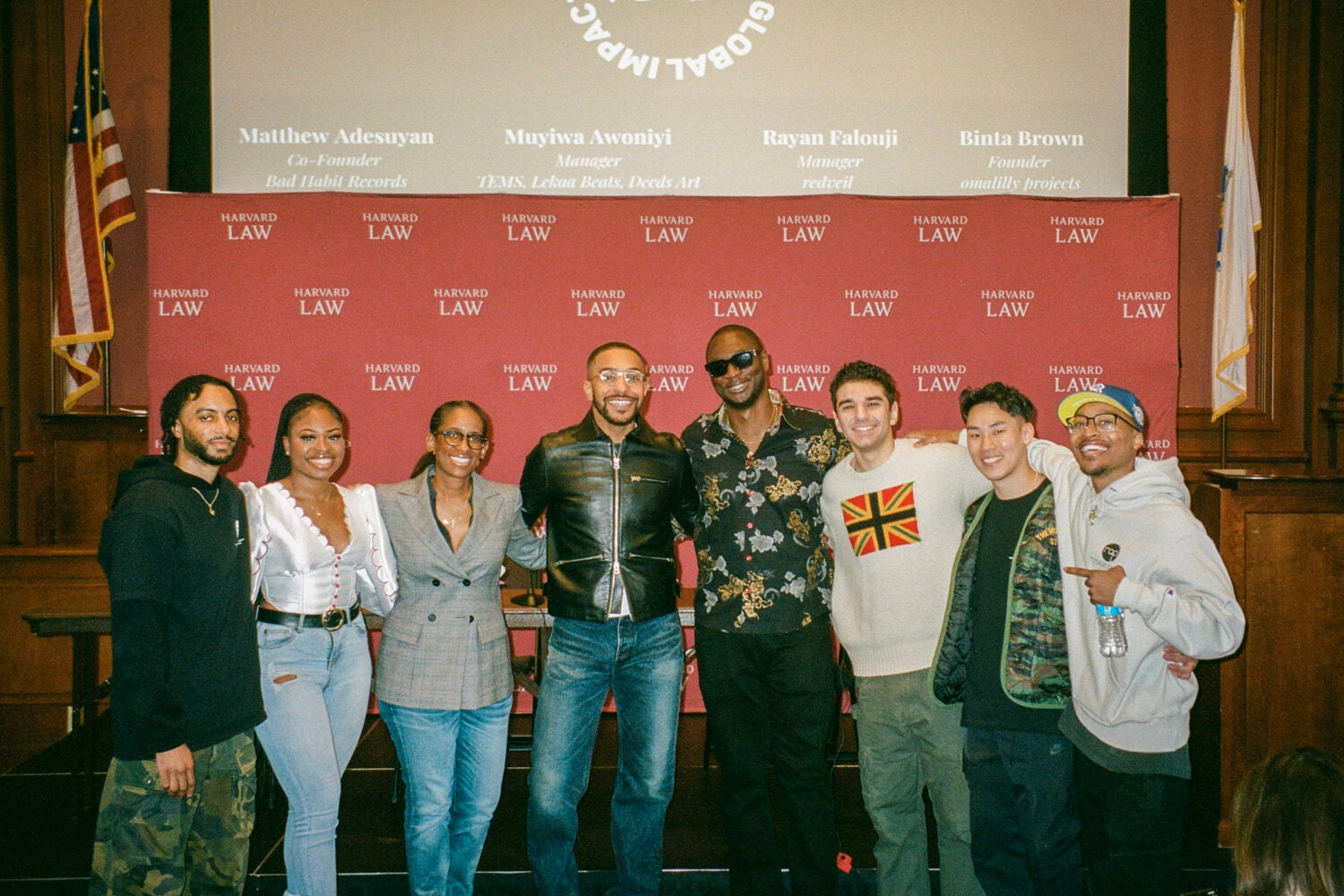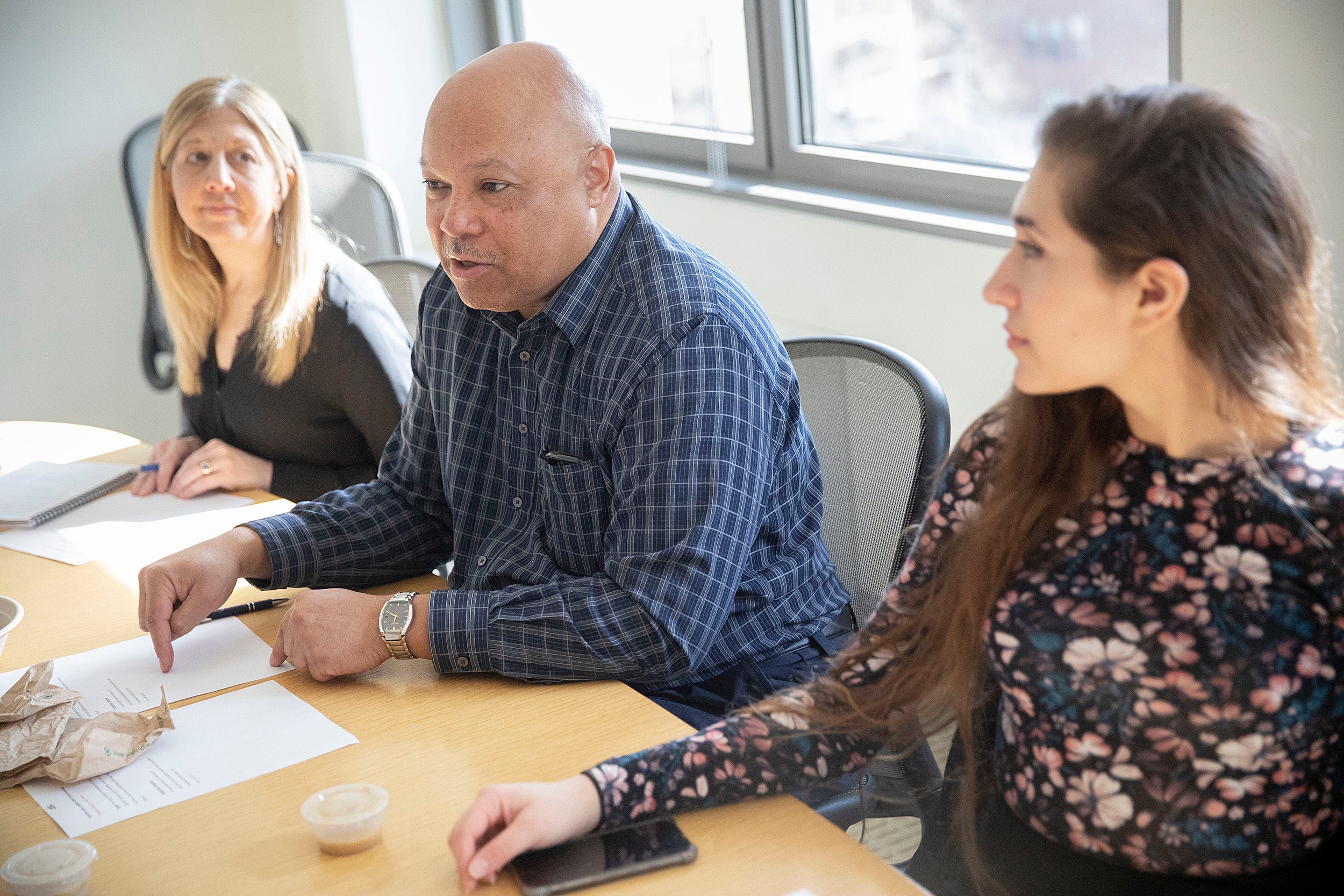Managers of several high-profile rap and pop musicians discuss working with artists and the music industry at a Harvard Law symposium

Students from Harvard Law’s Recording Artists Project welcomed artist managers and label executives from across the music industry including Binta Brown, CEO & Founder of omalilly projects and manager of popular Chicago-based rapper Vic Mensa; Matthew Baus, co-founder of Bad Habit Records; Muyiwa Awoniyi, manager of Nigerian singer-songwriter Tems; and Rayan Falouji, manager of rapper redveil.
So, you want to break into the rap or pop music world? Then you’d better start getting your business and legal skills together.
The Harvard Law School Recording Artists Project, known as RAP, was established in 1998 to provide expertise and pro bono legal assistance to the creative community. Last Saturday, the group, led by current co-presidents Landon Harris ’23 and Andrew Choi ’23, presented a daylong seminar, “Local Sounds, Global Impact,” which included a panel of industry professionals, a showcase of local artists who’ve worked with RAP, and breakout sessions afterward.
“If you create something out of nothing, you’re in a business,” said Boston music producer Rob Kelley-Morgan, introducing the event. “The minute you make a song, the minute you record your voice, you’ve just created a product. And that product needs to be protected.”
Strategies to protect and promote that product was the focus of the main panel, moderated by RAP Events Director Ify White-Thorpe ’24. Each of the four panelists was a prominent artist manager or record-label owner; while they came from diverse backgrounds, they all grew up with the same love of music.
The one lawyer on the panel was Binta Brown, who manages the popular Chicago-based rapper Vic Mensa. Later this semester, RAP will be bringing Mensa to the Harvard African Diaspora Conference, where he will speak about the music festival he launched this year in Ghana with Chance the Rapper.
“When I looked at career paths, I wanted to be like Clive Davis [Arista Records founder, HLS ’56] or Walter Yetnikoff [the late CBS Records president],” Brown said. “They each had law degrees and I saw how that could be helpful. I also had a deep and profound love of justice.”
After graduating from Columbia Law School, she worked in the prestigious firm Cravath, Swaine & Moore, which represented high-profile entertainment companies including Time-Warner and DreamWorks. “My journey has been unorthodox for artists’ managers, but I am hoping it won’t remain so.”
While she doesn’t believe in doing legal work for her artists, those skills still come in handy. “I can read contracts really fast, and I can have a conversation with their attorneys and understand what they’re saying. When the artist has a manager who can understand the attorneys and the businesspeople, you can’t hide the truth from them.”
“To me, the artist is the quarterback, and I’m the coach,” said Rayan Falouji, who manages the 18-year-old rap star redveil. “It’s a developed trust over time, and you have to let them fall on their face sometimes. Artists are naturally sensitive people, and you can’t tell someone what their vision is — There’s no ‘You have to do the song or the cover art this way.’ Sometimes the artist is right, sometimes I am, but you have to let the road pave itself. As long as he’s not doing something that would tank his career — like saying ‘I’m going to drop this country song as a rapper.’”
Sometimes it makes sense to pull back and let an artist live, he said, especially when you manage a youthful artist. He said that redveil’s recent trip to India will likely provide fuel for his work to come. “One of my mentors had an artist who took two years to make an album. After that, he made three in a month. He just lived, and it’s the living that makes them write and articulate about the state that they’re in.”
Matthew Baus, who runs the Bad Habit label, recalled a specific incident with an artist he previously managed, the Nigerian star Burna Boy. Last spring, Burna Boy insisted that “Last Last” would be the first single from his latest album, when the label had marked a different song for a high-profile rollout.
“That move changed our trajectory for the rest of the year,” Baus said. “He wanted to go onstage at the Billboard Music Awards, and perform a song that was not out yet. When someone is that specific, you need to follow their energy — and sometimes you have to follow crazy. You have to be the one that brings sanity, and sometimes you make impossible things happen.” And in this case, the artist’s instincts were sound; the song went on to be an international chart-topper.
As Baus pointed out, everyone there was in two businesses: The arts business and the entertainment business. “The arts business is ‘This is me; this is the story I want to tell.’ The entertainment business is ‘Who’s buying this, who’s going to the shows?’ The artist’s identity is the bottom line. Everything else plays into marketing, staying true to your mission statement.”
Sometimes you also have to say no, added Muyiwa Awoniyi. His own artist, the Nigerian-born star Tems, recently went viral for the extravagant dress she wore at the Oscars. Other ideas, he said, prove less workable. “One artist wanted to shoot a video that never came out, because it was basically impossible. It’s important that you and the artist are on the same page.”
During a legal breakout session afterward, RAP’s supervising attorney, Clinical Instructor Sam Koolaq ’16, addressed a smaller group of artists, producers and young entrepreneurs. And he asked the question on most peoples’ minds: How do musicians get paid? Most of the answers, he said, fall into two categories: Trademark income (merchandising, touring, etc.) and copyright income. Every time somebody buys a particular song, two copyrights are being honored: One for the recorded performance, the other for the written song. And the widespread popularity of sampling has brought an unprecedented number of copyright infringement cases.
Artists, he said, have dealt with sampling copyrights in different ways. The most prudent approach is to make an arrangement with the original copyright holder before releasing the track. The risk here is that the sample may be vetoed, and the song never released. Other artists simply choose to release the song and deal with the copyright later; this creates its own risks.
“I’d caution there that it costs more money if your song does well, “Koolaq said. “If your song gets five million streams, the copyright holder may say ‘We’ll take a piece of that.’ That was something Lil Nas X learned the hard way [after the major success of his sample-heavy ‘Old Town Road’].”
On the other hand, he said, such arrangements are great if you’re the copyright holder. “Nine Inch Nails got some mansion money out of that.”





